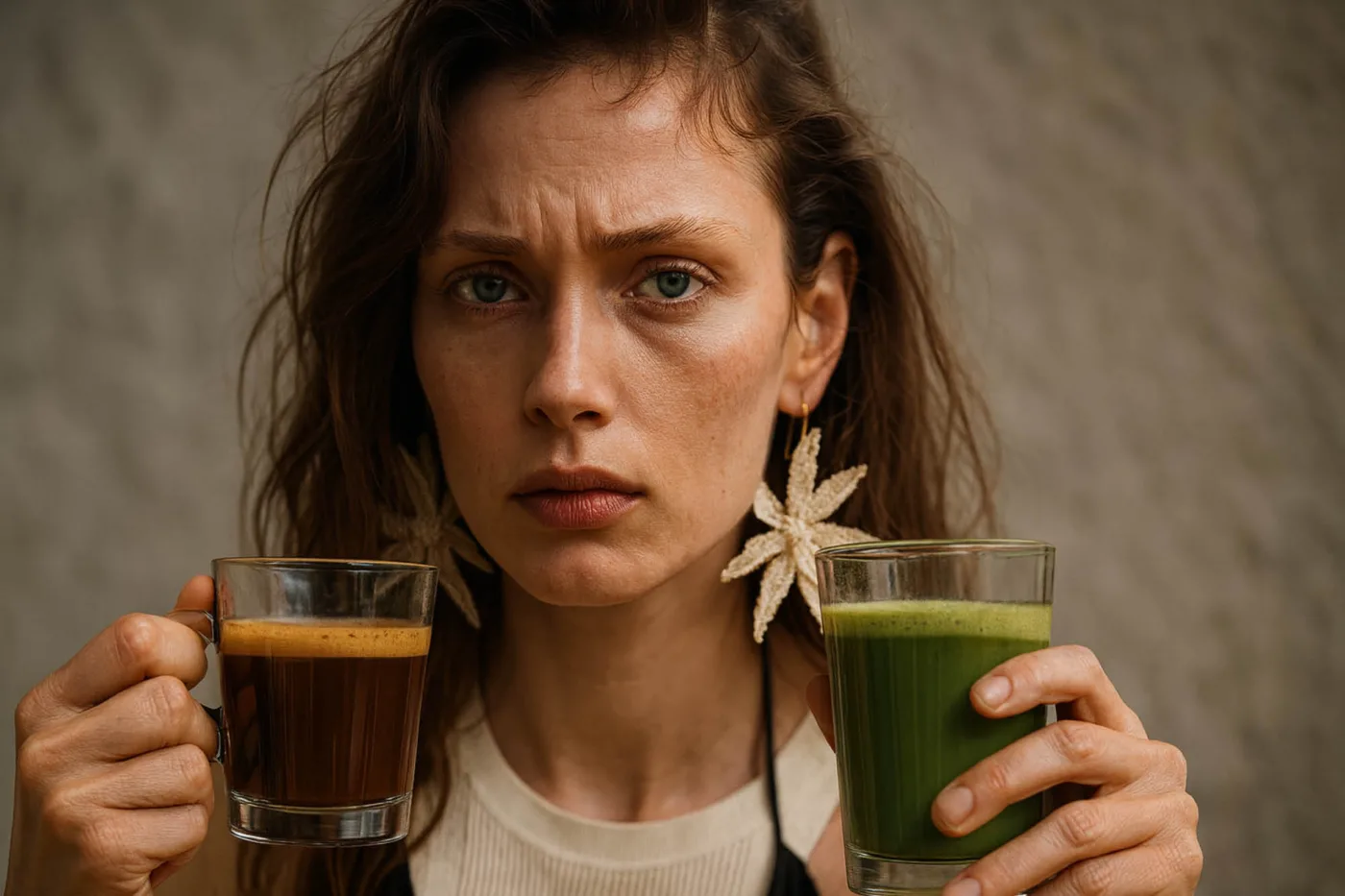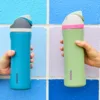Matcha vs. Coffee?! Fatigue has many faces. Some of us need an instant “kick-start,” while others swear by Zen-like focus without the shaky hands. Matcha and coffee promise alertness, but they deliver it via two very different routes. Which beverage really offers more stable energy throughout the day? We scoured over ten reliable sources and tackled the myths, numbers, and science behind it.
Matcha against coffee?! Stable energy is not euphoria in the first 20 minutes, but alertness without sharp peaks and troughs: good concentration, little "nervousness", as few crashes as possible in the middle of the day and no sabotage of evening sleep. caffeine it's not just a question of the drink, but also the dosage, the time of drinking, the meal, tolerance, and your genetics (the CYP1A2 enzyme – that mysterious conductor that determines how quickly you metabolize caffeine).
Caffeine Profile: The Numbers That Count – Matcha vs. Coffee
It's coffee caffeine classic starOne 240-ml cup of filtered coffee contains approximately 95–96 mg of caffeine (espresso ~65 mg/shot), depending on the bean and preparation.
Matcha? It's ground green tea—you drink the whole leaves. The caffeine content is therefore higher than regular steeped green tea, but it varies widely: about 19–44 mg of caffeine per gram. A typical 2–4 g serving delivers somewhere between 38–176 mg of caffeine, depending on the spoon, the quality, and whether you're more of a ceremonial or culinary type.
Translated into sensation: a standard "long black" usually hits harder due to the higher amount of caffeine per sip, while many servings of matcha (1–2 teaspoons) remain below or around a typical cup of coffee.
L-Theanine: The Secret Manager of Your Alertness – Matcha vs. Coffee
Matcha brings another player into the game: L-theanine, an amino acid that stimulates “alpha waves” in the brain—that calm focus that makes you feel present and collected. In randomized studies, the combination of L-theanine and caffeine improved attention and accuracy more than caffeine alone (at doses similar to tea).
One double-blind study even showed that L-theanine partially attenuated the vasoconstrictor effect of caffeine in the brain, although at very low tea doses it did not provide an additional "performance" effect - which clearly shows that dosage matters.
Systematic reviews of recent studies conclude: caffeine + L-theanine is a pair that reliably supports attention and information processing speed. In other words, less jitters and more focused alertness – ideal for precision work, driving, or long Zoom sessions.
Why does matcha seem to “last longer”?
Caffeine has a half-life of about 3–7 hours in adults (the range is huge, because we are all wonderfully diverse), so a lot depends on the dose and your metabolism. There is no good evidence that caffeine from matcha is physiologically “slower absorbed” than from coffee; it is more likely that the combination of a lower dose + L-theanine subjectively smooths out the edges. Add to that slower sipping and less “shot” culture, and you get a smaller peak – and a smaller crash.
Common sense in dosing (and sleep)
The European Food Safety Authority states that up to 400 mg of caffeine per day (and up to 200 mg in a single dose) is generally safe for healthy adults. Translated: 1–2 coffees or 1–2 cups of matcha with a moderate amount of caffeine should not be a problem – unless you are sensitive, pregnant or have specific medical conditions.
The golden rule for sleep is: set a personal caffeine “lockdown” of 6–9 hours before bed. Yes, even matcha at 5 p.m. can sabotage your night if you’re a slow metabolizer of caffeine.
Myth Buster: “137 Times More Antioxidants” and Other Legends – Matcha vs. Coffee
It's true that matcha is full of catechins (EGCG, etc.) – because you're drinking the whole leaf, your intake of these polyphenols is often higher than with steeped green tea. But numbers like "137×" are more marketing than a methodologically sound comparison; the levels vary widely between samples.
Coffee has its own polyphenols (e.g. chlorogenic acids) and has been linked to favorable outcomes for the heart, brain, and liver in numerous observational studies – meaning that even the “dark side” offers beneficial plant compounds.
A word of caution if you're a fan of capsules: EFSA has specifically looked at the safety of green tea extracts (catechins in megadoses), which is not the same as a cup of matcha. The doses for drinks are significantly lower.
Who will prefer matcha or coffee?
- Matcha is often more friendly if you tend to be nervous, are looking for calm focus, or want to have more than one drink a day without shaking your hands. The combination of L-theanine and moderate caffeine is your best friend here.
- Coffee It shines when you need a quick, powerful boost – for a morning launch or before a demanding performance. Just keep track of your total daily intake.
How to Drink for More Stable Energy (Regardless of Camp)
- First the dosage. For matcha, start with 1 g (½ tsp), increase to 2 g if necessary; for coffee, adjust the ratio of ground coffee to water so that a cup does not exceed ~100 mg of caffeine. (Hint: espresso is fast but concentrated.)
- Breakfast > empty stomach. A meal slows down absorption and reduces the “shaking.”
- The time zone of your sleep. Cut out caffeine 6–9 hours before your night's rest.
- No sugar, more water. Sugar causes its own mini-highs and lows; hydration helps keep the caffeine from taking over.
Verdict: Who wins the “stable energy” race?
If we measure stability as less nervousness + longer concentration without a significant drop, has matcha slightly preferred – mainly because of L-theanine and usually lower dose of caffeine per cup. Coffee is still queen rapid acceleration and is full of beneficial polyphenols, but for stability it is better to dose it wisely and time it according to your sleep rhythm. The ideal solution? Match the drink to the task: matcha for the "marathon" of concentration, coffee for the "sprint" - and both within a reasonable 400 mg/day.





